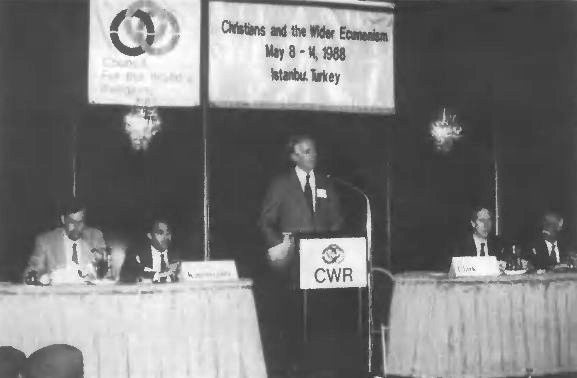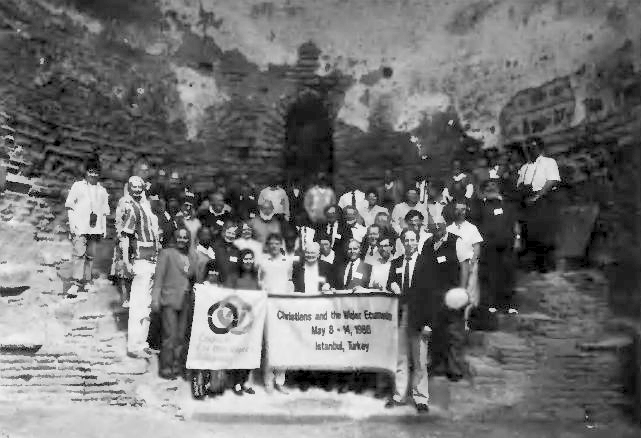![]()
The Words of the Watson Family
|
|
The Words of the Watson Family |

Dr.
H. Francis Clark, convenor, delivers an address at the conference.
Can Christianity cooperate with other religions, or must the fundamental approach of Christianity to non-Christians be only one of missionary zeal? Does accepting the religious value of non-Christian teachings compromise the centrality of salvation through Christ? Is interfaith dialogue limited to humanitarian cooperation, or can it also seek to transcend religious boundaries and establish spiritual unity between believers of different religions?
These profound and controversial questions were explored in depth at CWR's third annual intra-Christian conference held from May 8-14, 1988, in Istanbul, Turkey. Fifty Christian leaders and scholars from 21 nations, representing the Catholic, Orthodox, and Protestant traditions, met to explore the relationship between Christianity and the other religions of the world.
Participants included the Anglican Bishop of Johannesburg, South Africa, a close associate of Nobel Prize winner Bishop Desmond Tutu; one of the founders of the World Congress of Faiths, a leading interfaith organization; an advisor to the Archbishop of Canterbury on Interfaith Affairs; and several other of the most influential thinkers in Christian theology and philosophy of religion today.
The conference was entitled "Christians and the Wider Ecumenism." Traditionally, "ecumenism" means the promotion of unity and cooperation among Christian denominations. The "wider ecumenism" refers to the worldwide interfaith movement and presents Christian scholars and leaders with special theological and practical issues affecting Christians in their encounter with non-Christians.
The questions asked above were explored in a variety of ways. First, each participant was asked to prepare a paper on the conference theme. These ranged from theological and scriptural studies to reports on the practical realities of interfaith encounter and worship. Discussion groups provided the primary framework for the dialogue. Second, plenary addresses by representatives of the various Christian traditions presented a wide range of viewpoints. A third major component of the conference was daily worship services in the various Christian traditions. Through these morning services, participants could experience and appreciate many different expressions of their shared faith.
A special feature of the conference was the opportunity to visit significant Christian sites in Istanbul and the surrounding areas. Until 1930, Istanbul, which is actually situated in Europe, was called Constantinople, after Constantine, the first Christian emperor of the Roman Empire, who founded the city in A.D. 330. Until it was conquered by the Ottoman Turks in 1453, Constantinople was the capital of the eastern Roman or Byzantine Empire and was a pivotal center for Christianity. Today Turkey is a Muslim nation, yet Orthodox Christians around the world still regard the Patriarch of Istanbul as their spiritual leader. Conference participants had a private audience with the present Patriarch, His All Holiness Dimitrios. The Patriarch personally greeted each of them, delivered a message of Christian unity, and blessed the work of the ' C W R.
Participants also visited the Church of Saint Sophia, once the central church of Christendom, built by the emperor Justinian and completed in A.D. 537. The magnificent domed basilica was the architectural wonder of its time and ranks with St. Peter's of Rome as one of the greatest churches in history. In 1453 it became an Islamic mosque. It was made into a museum in 1930. Because of its rich and varied history, the
Church of Saint Sophia symbolizes Christianity's history of conflict and cooperation, and tolerance and intolerance, in its encounter with other religions of the world.

Participants
of CWR's third inter-Christian conference gather at the Nicaean
Church near Bursa, Turkey, where Christians held the seventh
Ecumenical Council in A.D. 787.
The final two days of the conference were held in Bursa, a smaller city in the part of Turkey that lies in Asia Minor. From Bursa, participants were able to visit Nicaea, now called Iznik, the site of the first and seventh ecumenical councils of early Christian history.
These councils, held in the years 325 and 787, are especially important as symbols of Christian unity because they brought together representatives of all the Christian churches to decide upon crucial questions of doctrine and practice. At the small church where the seventh council was held, the last council to be recognized by both the Eastern Orthodox and Roman Catholic traditions, the CWR participants gathered for a group photo, symbolizing their commitment to the ideals of Christian unity held by Christian leaders who had gathered in the same spot 12 centuries before.
Through five days of discussion, worship, fellowship, and pilgrimage, conference participants were able to see more clearly the challenge to Christianity to put its own house in order as it faces the call to live responsibly in an inter-religious world. In his remarks to the scholars (delivered by Dr. Thomas Walsh, IRF director) Rev. Chung Hwan Kwak, the president of IRF, said:
Inter-religious cooperation is not foreign to any of the streams of Christianity represented here; it is there at the very root! The many expressions of Christianity need leaders who have recovered Jesus' spirit, and then they will be able to take charge of the world's future. This revitalization will connect the past and the future, recovering the best resources of tradition for creative application to the needs of today. When this is achieved, Christianity will be capable of fulfilling God's providential purpose in this age.
This conference was an important step in the continuing work of the Council for the World's Religions in spreading the Unification movement's vision of world peace through religious dialogue and harmony.